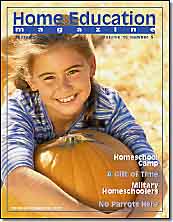

|
Anecdotes – Learning in the Real
World
by Helen and Mark Hegener
The reporter was wrapping up her half-hour interview. “Okay, Mrs. Hegener, one last question... do you have any homeschooling anecdotes I could share with my readers?”
“Any whats?” I usually leave the interviews to Mark. He's the talker around here, I'm just the writer. Telephone interviews are not exactly my forte, but this reporter had caught me, and up to this point I felt like I'd done pretty well. But anecdotes?
“You know, nice little stories about your homeschooling experiences... I'm sure you must have some good ones...”
Well, yes, actually I did. Quite a few of them. With five totally homeschooled kids now ages 9 to 21 you can bet I had some 'anecdotes.' But I couldn't think of any to share with this reporter. She just wouldn't understand.

Nine year old Michael and his cousin Nick found an old dried snakeskin up the creek the other day. They proudly brought it back and showed it to everyone, asked a few questions and got fairly knowledgeable answers, found a safe place to display their snakeskin above Dad's computer, and then spent about an hour digging out books and searching for pictures of snakes. They talked about the different kinds of snakes that live around here, the types of snakes found in other parts of the world, the biggest and most poisonous snakes. Michael told Nick about catching garter snakes, running into rattlesnakes on packtrips, and seeing a gigantic boa constrictor at the Seattle Zoo. Nick told Michael that snakes don't live in Alaska, where he grew up. In short, they had an impromptu unit study on snakes. Nobody told them to, or directed their explorations, or quizzed them on snakes. It's anybody's guess what either of them actually learned.
Jim, our 19 year old, bought a new engine for his 1970 GMC pickup this week. His Dad and older brother John have both been helping him put it into his truck, with lots of discussion about how engines work and why things have to be done certain ways. The motor manuals are getting a workout, 13 year old Christopher has been enlisted as go-fer. It's fun to sit and listen to them rehashing past engine rebuilds as they work, telling stories of Grandpa's fixing an engine part with one of Grandma's hairpins, patiently explaining why it's important to time an engine just so... The final exam will come when Jim turns the key and gives his new engine a little gas. No doubt they'll take it for a spin up the hill and come back proud of themselves. Any lessons learned in the whole process will be stored for future reference.
I sometimes wrestle with a feeling that not very many people would understand the way we homeschool our children. Some would undoubtedly consider it benign negligence, others would have more damning names for it. Many people have told us they admire our approach, but could never do it with their own kids. Even the few who have honestly tried to understand our style of homeschooling have said they couldn't do it all the time.
Our children have always been completely responsible for their own learning, from the ABCs on up. They've known from day one that they've had our complete and loving support, and that we'd be here to help them whenever they asked for it. There's been no delineation in our family between "learning" and "living." As we live, we learn. It's as simple as that.
Yes, we've bought workbooks in moments of self-doubt. Sometimes they've gotten a little mileage from an interested kid, but mostly they've sat around unopened and unused, just sort of there to make us parents feel better. When our two oldest boys were around 6 and 8 we went through a prolonged spell of working together every day: writing in journals, solving math problems, practicing handwriting, drawing pictures while listening to storytapes, and other varieties of schoolish activity. Eventually, the boys got tired of it and so did we. If the younger three ever did such things on a regular basis they kept it a secret from the rest of us.
We've always expected our children to be honest, to treat each other and everyone else with kindness and respect, to work hard, and to just basically be good people. We've proceeded from the assumption that they were all bright and intelligent children, that they wanted to be even brighter and more intelligent adults, and that they would learn what they needed to know, on their own, as it became desirable or necessary. We've been known to give them a push into deeper waters once in a while by giving microscopes for Christmas and computers for birthdays, but on the whole stuff like books, computer programs, educational games and the like are just there for everyone's use and enjoyment.
From time to time over the years our kids have discussed the notion that our family is a little different from others. They seemed to acknowledge early on that we're not the crazy ones, that it is crazy to expect children to leave home and family and spend their formative years doing meaningless busywork in regimented classrooms. But what's heartwarming is their open agreement that children do not really need lesson plans and pop quizzes to become capable, knowledgeable adults. Yes, we've undoubtedly led them to that conclusion through our years of propagandizing, but their willing acceptance of it seems even more heartfelt than our own relatively late-in-life discoveries.
That acceptance hasn't come without a few bumps and bruises along the way. As with anything important in life, there have been moments of confrontation, soul-searching, and questioning. Difficult to understand at the time, these incidents have later been recognized for what they were: opportunities for us to make sense of how we've chosen to live our lives. We've come to see that we all need occasional examination of our assumptions, exploration of our reasoning. Sharing our thoughts and ideas together has led us to a point where we each understand what is important to everyone else, and it has given us a basis for supporting goals, plans, dreams... a "family language," so to speak.
Our children understand this language much better than we adults ever will, because they've grown up with it. They didn't need to convince themselves or each other that it was a good idea, and they haven't needed continuous affirmation that it works. For them, it's made sense from the beginning.
Mark and Helen Hegener are the parents of five always-unschooled kids: John (32, married, two daughters), Jim (30, married, two daughters), Jody Ellen (27), Christopher (27), and Michael (21). The Hegener family lives in both Alaska and Washington state, dividing their time between the two, and they enjoy fishing, sailing, gardening, and frequent travels, among many other pursuits. Since 1984 they've published the award-winning Home Education Magazine for homeschooling families, and over the years they have edited and published many books on homeschooling and alternative education.
 |
Back to BestHomeschooling Home |
Copyright 2004 BestHomeschooling.org. All rights reserved.
Please feel free to link to this site, BestHomeschooling. org, but do not
copy material and/or reproduce or distribute it in any way without
permission. Authors of articles retain the rights to their own
articles which may not be reproduced without their permission. |